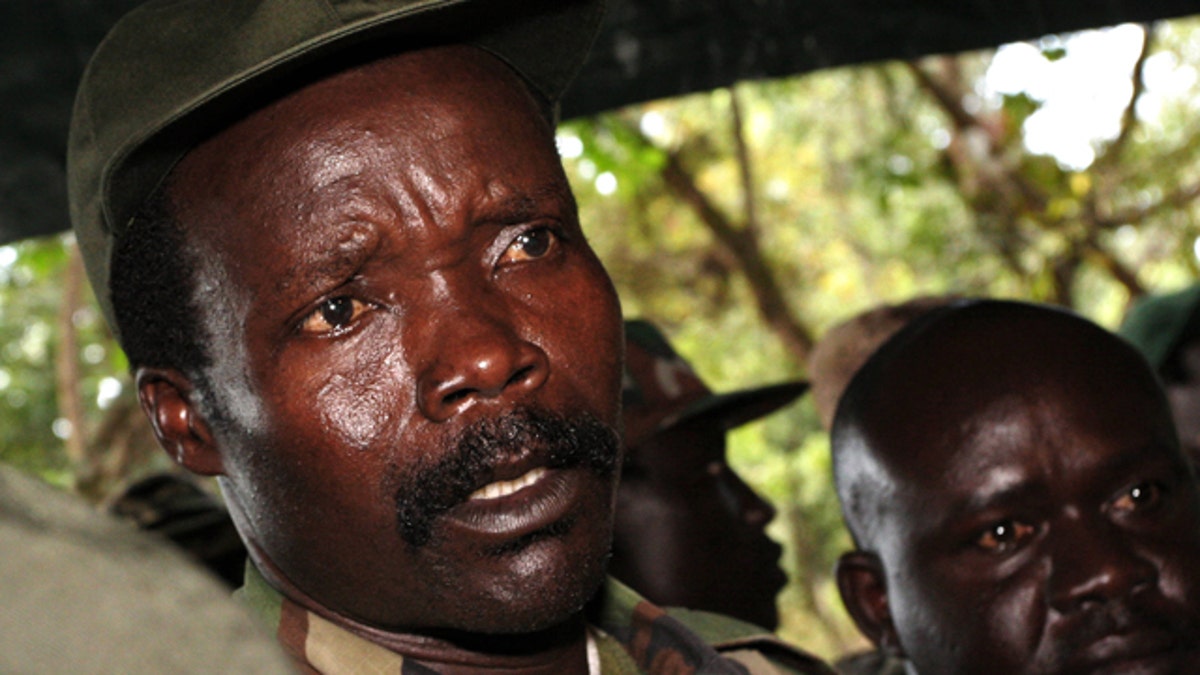
Joseph Kony, the elusive leader of the Lord's Resistance Army, believes himself to be the spokesman of God. (AP) (AP)
KAMPALA, Uganda – Ugandan criticism of a viral video about a brutal central Africa warlord continued to swell in the wake of a public screening in a remote Ugandan town once terrorized by the Lord's Resistance Army.
The head of a Ugandan charity that showed "Kony 2012" said Thursday he will suspend further screenings after getting overwhelmingly negative feedback from viewers on Tuesday who failed to understand why there were so many white faces in the video, or why Kony needs to be made famous.
The collective feedback amounts to a rejection of the video in a region that was once terrorized by Kony. The American advocacy group Invisible Children wants to raise global awareness of the fugitive rebel leader who is wanted by the International Criminal Court for war crimes and crimes against humanity.
"There was a strong sense from the audience that the video was insensitive to African and Ugandan audiences, and that it did not accurately portray the conflict or the victims," Victor Ochen of the African Youth Initiative Network, said in a statement. "In particular, viewers were outraged by the KONY 2012 campaign's strategy to make Kony famous and their marketing of items with his image."
The video, which has been viewed nearly 80 million times on YouTube, has put Kony in the international spotlight, but some critics have said the video oversimplified the conflict. An international manhunt has sent Kony and his fighters deep into the remote Central Africa bush. U.S. special forces are aiding the hunt in four central African countries, including Uganda.
Kony is believed to be hiding in the Central African Republic, where he fled before an aerial assault on his forested base in eastern Congo in 2008. Ugandan officials say he is no longer a threat to Uganda and that he has only a few hundred combatants across Central Africa, including in South Sudan and Congo.
The Ugandan government said last week that it welcomed any effort that makes it possible to catch Kony but warned against misrepresenting the status of the LRA.
"Misinterpretations of media content may lead some people to believe that the LRA is currently active in Uganda," said Fred Opolot, a government spokesman. "They are a diminished and weakened group with numbers not exceeding 300."
In the northern town of Lira, where children once slept in streets because they were too afraid to stay home while the LRA were on the loose, the 30-minute film resurrected bad memories of Kony, who abducted up to 30,000 children and left millions homeless over the years.
In the Invisible Children video, filmmaker Jason Russell discuses Kony and the LRA with his young son, Gavin. That conversation concerned one viewer who saw the film in the LRA-effected area, Ochen said.
"How can the issue of northern Uganda be discussed by just a 3-year-old American kid who does not know anything to do with our plight? We are afraid that every American child will now look at every mature black African as a bad person," Ochen said, citing the viewer's reaction.
